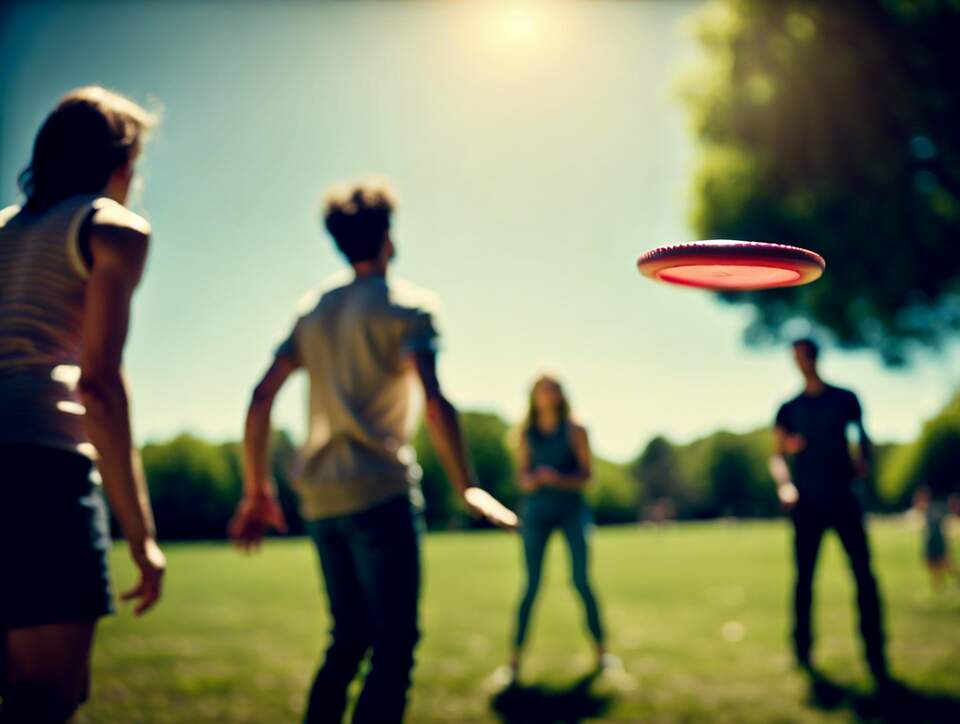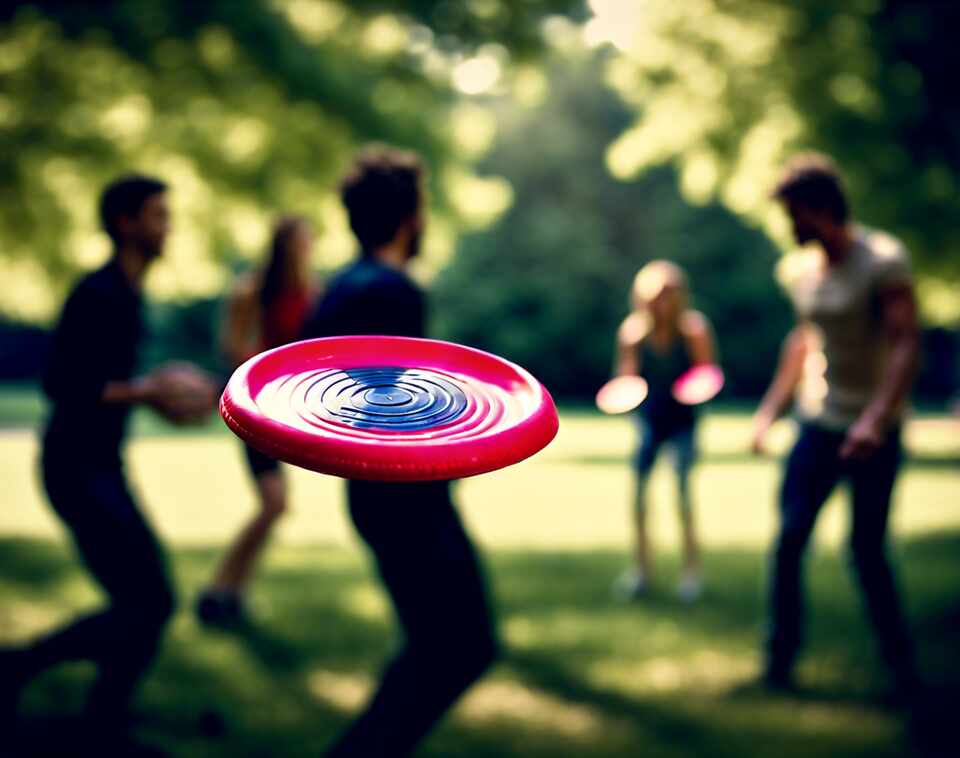Ever pondered whether disc golf qualifies as a legitimate sport or remains simply a recreational activity? It’s a debate that often arises among enthusiasts and skeptics alike. Join us on a journey to explore the nuances of disc golf, uncovering what sets it apart and whether it truly merits the designation of a sport.

Is Disc Golf a Sport?
Disc golf, often referred to as Frisbee golf, is a flying disc game where players throw a disc at a target, aiming to complete each hole in the fewest throws. The question of whether disc golf is a sport has been a topic of debate among sports enthusiasts and players alike. Let’s delve into the key aspects that define a sport to determine where disc golf fits in.
Defining a Sport
To determine whether disc golf qualifies as a sport, it’s essential to consider certain criteria that define traditional sports. Sports typically involve physical exertion, skill development, competition, and set rules and regulations. In the case of disc golf, players engage in physical activity by traversing the course, often through varied terrains and obstacles, while strategically planning each throw to achieve the best outcome.
Physical Demands
Disc golf requires players to exhibit strength, coordination, and accuracy in their throws. The repetitive motion of throwing discs, combined with walking or hiking between holes, contributes to the physical demands of the game. Players need to have good hand-eye coordination, balance, and agility to navigate the course effectively, especially when encountering challenging environmental conditions or long distances between holes.
Mental Aspects
In addition to the physical requirements, disc golf also tests players’ mental fortitude. Competitors must analyze the course layout, factor in wind conditions, obstacles, and elevation changes, and make strategic decisions on disc selection and throwing techniques. Maintaining focus, managing pressure, and adapting to changing circumstances are crucial mental skills that players cultivate through practice and competition.
Competitive Landscape
Over the years, disc golf has evolved from a recreational activity to a competitive sport with organized tournaments, leagues, and professional players. The Professional Disc Golf Association (PDGA) sanctions various events worldwide, offering players of all skill levels the opportunity to compete and showcase their abilities. The growth of disc golf as a competitive sport highlights its legitimacy and recognition within the sports community.
Disc golf encompasses elements of physical exertion, skill development, competition, and structured gameplay, aligning with the fundamental characteristics of a sport. While some may debate its classification, the popularity, and growth of disc golf as a competitive activity speaks to its status as a legitimate sport. Whether played casually or competitively, disc golf offers individuals a rewarding experience that combines athleticism, strategy, and camaraderie in a dynamic outdoor setting.
The Physical Demands of Disc Golf
Disc golf is a rapidly growing sport that combines elements of traditional golf with the skill and precision of throwing a disc. It has gained popularity due to its accessibility, low cost, and inclusivity. The physical demands of disc golf are often underestimated, as it requires a unique set of skills and fitness levels to excel in the sport.
Physical Demands of Disc Golf
When considering the physical demands of disc golf, it’s essential to understand that it is a full-body workout that engages various muscle groups. Players need to have strong core muscles for stability and power generation during throws. The explosive movements involved in driving off the tee and making long putts require leg strength and balance to execute accurately.
Moreover, disc golfers must have excellent hand-eye coordination to control the flight path and distance of the disc. Grip strength is another crucial factor as players need to hold the disc securely while generating enough spin for a controlled flight. Endurance is also vital, especially during tournaments that can last several hours, requiring players to walk long distances over rugged terrains.
Conditioning for Success
To meet the physical demands of disc golf, players should incorporate a well-rounded fitness routine into their training regimen. This could include strength training exercises to build muscle power, agility drills to improve movement control, and flexibility exercises to prevent injuries. Cardiovascular workouts are essential for building endurance and stamina, enabling players to perform consistently throughout a round.
Additionally, practicing proper throwing techniques and form can help prevent overuse injuries and improve performance on the course. Players should focus on developing a smooth and efficient throwing motion that maximizes distance and accuracy while minimizing strain on the body. Regular practice and repetition are key to mastering the various shots required in disc golf, from drives to approach shots and putts.
The physical demands of disc golf should not be underestimated, as it requires a combination of strength, coordination, endurance, and mental focus to succeed in the sport. By incorporating a comprehensive fitness routine and honing their skills through practice, players can improve their performance on the course and enjoy all the benefits that disc golf has to offer.
Skillsets Required for Success in Disc Golf
The Skillsets Required for Success in Disc Golf
When it comes to excelling in the sport of disc golf, there are several key skillsets that players need to develop in order to perform at a high level. These skills encompass a combination of physical abilities, mental acuity, and strategic thinking that are essential for success on the course.
First and foremost, disc golf requires excellent hand-eye coordination. Players must be able to accurately judge distances and angles while throwing discs of various weights and flight characteristics. The precision required to navigate through trees, over water hazards, and around obstacles demands a high level of coordination that can only be honed through dedicated practice.
Furthermore, disc golfers must possess strength and endurance. While not as physically demanding as some traditional sports, disc golf still requires players to walk long distances over varied terrain while carrying a bag of discs. The ability to maintain focus and execute consistent throws throughout the course of a round requires a level of fitness that should not be underestimated.
In addition to physical skills, successful disc golfers must also cultivate mental toughness. The sport presents numerous challenges that can test a player’s patience and resilience. Whether it’s overcoming a bad hole, adjusting to changing weather conditions, or maintaining focus in the face of distractions, mental fortitude is a vital asset for competitive disc golfers.
Another critical skill for disc golf success is course management. Players must possess a deep understanding of the layouts of different courses, including the best routes to the basket and how to avoid potential hazards. Strategic decision-making, such as when to play conservatively and when to take risks, can often be the difference between a good round and a great one.
effective communication and sportsmanship are essential components of success in disc golf. Whether playing in casual rounds with friends or in high-stakes tournaments, being able to interact positively with fellow players, respect the rules of the game, and handle both victories and defeats graciously are all crucial aspects of being a well-rounded disc golfer.
The skillsets required for success in disc golf encompass a wide range of physical, mental, and emotional abilities. Developing these skills through practice, training, and experience is key to unlocking one’s full potential as a competitive disc golfer.
The Growth of Disc Golf as a Competitive Sport
For decades, disc golf has been gaining momentum as a competitive sport, attracting a growing number of enthusiasts and professional players worldwide. The sport’s rise in popularity can be attributed to several factors that have contributed to its evolution from a casual recreational activity to a highly organized and competitive sport.
Professional Disc Golf Association (PDGA): One of the key drivers behind the growth of disc golf as a competitive sport is the establishment of the Professional Disc Golf Association (PDGA) in the 1970s. The PDGA serves as the governing body for professional disc golf tournaments and players, setting standards, rules, and guidelines for competition. Through the PDGA, players can earn official player ratings, compete in sanctioned events, and participate in national and international championships.
Increased Sponsorship and Media Coverage: As disc golf has gained traction in recent years, there has been a significant increase in corporate sponsorships and media coverage for major tournaments and events. Companies are recognizing the marketing potential of aligning their brands with disc golf, leading to more financial support for players and competitions. In addition, the sport has been featured in various sports networks and online platforms, exposing a broader audience to the excitement and skill involved in professional disc golf competitions.
Growing Tournament Circuit: The disc golf tournament circuit has expanded significantly, offering players of all skill levels the opportunity to compete in a variety of events throughout the year. From local leagues and regional championships to prestigious national and international tournaments, the competitive landscape of disc golf continues to diversify and grow. Players can challenge themselves against top competitors, earn rankings and recognition, and showcase their talent on different courses around the world.
Development of Training Programs and Coaching: To enhance performance and competitiveness, the disc golf community has seen a rise in specialized training programs and coaching services. Players looking to excel in the sport can now access professional guidance on technique, mental preparation, physical conditioning, and strategy development. These resources help aspiring athletes hone their skills, improve their consistency, and elevate their game to compete at higher levels.
Inclusion in Multi-Sport Events: Disc golf’s inclusion in multi-sport events like the World Games and the World Urban Games has further solidified its status as a legitimate and recognized competitive sport. Athletes from different backgrounds and disciplines now have the opportunity to showcase their talent and represent their countries in these prestigious international competitions. As disc golf continues to integrate with other sports on a global stage, its competitive appeal and accessibility are expected to expand even further.
The growth of disc golf as a competitive sport is evident in the increasing participation, support, and recognition it has garnered over the years. With a thriving tournament scene, professional organization, and rising media presence, disc golf has firmly established itself as a dynamic and exciting sport that continues to captivate players and fans alike.
A Comparison Between Disc Golf and Traditional Sports
Disc golf and traditional sports have both similarities and differences that make them unique in their ways. While traditional sports like basketball, soccer, and football are deeply rooted in history and have massive followings worldwide, disc golf has been gaining popularity steadily over the years. Let’s explore some key points of comparison between disc golf and traditional sports.
Physical Demand:
In traditional sports, athletes often engage in high-intensity physical activities that require strength, endurance, and agility. On the other hand, disc golf may seem less physically demanding at first glance. However, disc golf still requires players to walk long distances, navigate varying terrains, and make precise throws. The physical demand in disc golf may not be as intense as in traditional sports, but it is still a crucial aspect of the game.
Mental Focus:
Both disc golf and traditional sports require a high level of mental focus and concentration. In traditional sports, athletes need to make split-second decisions, adapt to changing game conditions, and strategize to outsmart their opponents. Similarly, disc golfers must concentrate on factors like wind speed, disc stability, and course obstacles to make accurate throws. The mental aspect of disc golf is just as critical as the physical aspect, if not more.
Competitive Nature:
Traditional sports are known for their competitive nature, with athletes striving to win championships, titles, and accolades. Disc golf, although less mainstream, has a growing competitive scene with professional players competing in tournaments worldwide. The competitive spirit in disc golf is evident as players aim to improve their skills, achieve lower scores, and climb the ranks in the disc golf community.
Skill Development:
Athletes in traditional sports develop specific skill sets such as shooting accuracy, ball control, speed, and teamwork. Similarly, disc golfers hone skills like driving distance, accuracy, putting finesse, and course management. While the skills required in disc golf may differ from those in traditional sports, both types of athletes dedicate time and effort to improve their abilities and excel in their respective disciplines.
Community and Culture:
Traditional sports have established communities, fan bases, and cultural significance that transcend borders and generations. Disc golf, although relatively newer, boasts a supportive and inclusive community of players, fans, and enthusiasts. The culture of disc golf promotes camaraderie, sportsmanship, and environmental stewardship, creating a unique and welcoming atmosphere for players of all ages and backgrounds.
While disc golf and traditional sports have their differences, they share common elements that make them valuable forms of recreation, competition, and self-expression. Whether you prefer the fast-paced action of traditional sports or the leisurely pace of disc golf, both offer opportunities for physical activity, mental stimulation, skill development, and community engagement. Embracing the diversity of sports experiences can enrich our lives and foster a deeper appreciation for the games we love to play and watch.
Key Takeaway:
Disc golf is indeed considered a sport due to the significant physical demands it places on players, the diverse skill sets required for success, and its evolution into a competitive sport over the years. The game involves players throwing a disc into a series of metal baskets in as few throws as possible, akin to golf. Despite its casual and leisurely reputation, disc golf requires players to exhibit physical strength, endurance, and precision to navigate through challenging terrains and varying weather conditions.
To excel in disc golf, players must possess a combination of skills such as strong throwing technique, strategic thinking, mental focus, and adaptability to different course layouts. Mastering the various types of throws, including backhand, forehand, and overhand shots, is essential for achieving lower scores and outperforming competitors. Additionally, players need to have a good understanding of disc selection, distance control, and wind conditions to optimize their performance on the course.
In recent years, disc golf has seen a surge in popularity and competitiveness, leading to the establishment of professional tournaments, sponsorship deals, and a dedicated community of players worldwide. The sport’s growth has been fueled by increased media coverage, corporate sponsorships, and the creation of professional organizations like the Professional Disc Golf Association (PDGA), which governs and promotes the sport at a global level.
When comparing disc golf to traditional sports like golf, tennis, or soccer, it becomes evident that disc golf shares many similarities in terms of strategy, skill development, and competitive intensity. However, the unique blend of physical exertion, mental acuity, and outdoor elements sets disc golf apart and adds an exciting twist to the world of sports. As more people discover the thrill of disc golf and its competitive nature, the sport is poised to continue its upward trajectory and attract a new generation of athletes and enthusiasts alike.
Conclusion
In the world of sports, disc golf stands out as a unique and challenging activity that continues to gain popularity globally. The debate over whether disc golf qualifies as a sport is ongoing, with proponents highlighting its physical demands and competitive nature. The physical demands of disc golf require players to exhibit strength, agility, and precision in their throws and strategic decision-making throughout the game. As players navigate courses with varying terrain and obstacles, they must possess a high level of physical fitness to excel in this sport.
Success in disc golf requires a diverse set of skillsets that combine athleticism, hand-eye coordination, and mental acuity. Players must master a variety of throwing techniques, including backhand, forehand, and overhead throws, to adapt to different course layouts and challenges. Additionally, strategic thinking, focus, and adaptability are crucial for navigating courses efficiently and scoring well. The ability to read wind conditions, analyze distances, and make split-second decisions adds a dynamic element to the game, making it both mentally stimulating and physically demanding.
The growth of disc golf as a competitive sport is evident in the increasing number of tournaments, leagues, and professional players participating in the sport. Disc golf organizations and associations have been instrumental in promoting the sport, establishing standardized rules and guidelines, and cultivating a sense of community among players worldwide. The emergence of top-level professional players and the rising popularity of disc golf media coverage have further solidified its status as a legitimate and respected competitive sport.
Comparing disc golf to traditional sports reveals both similarities and differences that highlight its unique position in the sports world. Like traditional sports, disc golf requires skill, dedication, and practice to compete at a high level. However, the individual nature of disc golf sets it apart from team-based sports, allowing players to focus on their personal performance and strategy. The accessibility of disc golf, with relatively low equipment costs and open courses for all skill levels, contributes to its inclusive and welcoming community.
Disc golf’s status as a sport is supported by its physical demands, required skillsets, competitive growth, and distinct characteristics compared to traditional sports. As more players discover the challenges and rewards of disc golf, the sport is expected to continue expanding and evolving on both amateur and professional levels. Whether played for recreation, competition, or fitness, disc golf offers a dynamic and engaging experience that appeals to a diverse audience of sports enthusiasts.


